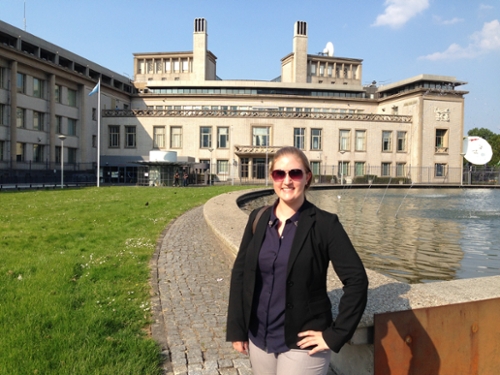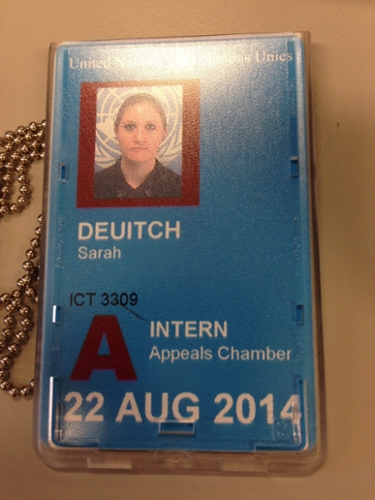The ICTY and Den Haag are so much more incredible than I imagined (despite visiting both four years ag0). It only took me a week to write this (oops) but here are a few of the highlights from my first week!!
Beach Day!!
On Sunday, 18 May, the day before I started work at the ICTY, I took advantage of the unusually warm and sunny weather and went to the beach. My apartment is only ten minutes from the beach, and it is a lovely walk by the two harbors. Once the real herring season starts in June – it will probably be stinkier than I can handle with all the fishing boats docking, but if I’m going to become a true resident of The Hague, I will need to deal!
The beach was absolutely gorgeous. Dutch and ex-pats alike flocked to the shell-filled sands to soak up the warm sun. I started trying to read an International Criminal Law textbook that I brought with me, but quickly realized it was too unwieldy and windy to handle that. Also, not exactly light beach reading. So I switched to reading The Jungle by Upton Sinclair on my Kindle. Now THAT is absolutely beach reading…
It was the perfect afternoon. It only ended when the wind got way too much for me to handle. Once home, I prepared dinner and got ready for my first day of work!!
The First Day of the Rest of My Life
A rather serious title, but 19 May truly was a crucial day in my life to get on the legal career path I want. And it started appropriately with…hours of orientation and procedure. Oh. International Criminal Law (ICL) did not start out as exciting as I thought it would. :-) The most valuable part of my first day was meeting my fellow interns. There is an amazing group of unpaid interns in this building, and I enjoyed meeting both those who started with me on Monday and those in my office, which I have lovingly named “The Bat Cave” (as it is a large open space in the basement of the ICTY that just happens to have ten desks for interns to work).

Monday night after work, I met up with two other new interns to go have a drink on the beach. The weather was in the 70s with mostly clear skies as we lounged at an outdoor bar and watched the sun set. It really did not even set before I got home at 10pm. Gotta love northern Europe in the summer time! I really enjoyed hearing the similarities and differences between lives, schools, aspirations, everything about these two lovely ladies. Also they like Rose Prosecco as well, so you know, fast friends. It was the perfect way to end the first day.
Work
The rest of my first week was mostly focused on getting comfortable with the ICTY and the people in it. I had various meetings each day with members of my team who walked me (and another new-ish intern on the team) through different research and writing processes. My team leader gave me a desperately-needed history of the war(s) of the former Yugoslavia. Though my father was deployed to both Bosnia and Kosovo during these conflicts, I was young and not really cognizant of what was happening, nor was he ever able to really tell me what was going on. So Wayde (my fearless team leader/summer host) broke it down for me, and I have to say that I am now a bit sad I didn’t go outside of “Classical” history when I was an undergrad.
Let me give a brief summary of what I do. It is largely confidential, but I can give the general parameters. I am a legal intern in the Appeals Chamber of the ICTY, meaning that I work with a drafting team on a specific case to handle all the appeals that the defendant(s) and Office of the Prosecutor (OTP) have made after the original judgment. The panel of judges is different for the appeal than the trial, including an increase from three to five judges. As a team, we (and I’m being generous here including myself after just one week) draft the decisions for individual motions and the overall appellate judgement (yup – English spelling with an “e”) regarding the appeals. The specific case my team is working on is Popović et al. There were seven original defendants but one died and one did not appeal, so there five defendants for the appeal. The crime base for all of them is the Srbrenica genocide of July 1995 in Srbrenica, Bosnia. 8,000 Bosnian Muslim men and boys were rounded up and murdered one by one.
It is truly humbling that I get to be a part of history by working at the ICTY. My name may not go on any judgments or decisions and I may just be one of thousands of yearly interns, but I am so proud to be working with an amazing history-making organization to bring justice to victims and hopefully prevent future war crimes and crimes against humanity.
Okay, enough with the sappy. This week, I also started cite-checking. I have roughly 223 pages to complete in the next 3-4 weeks with close to 2000 footnotes. Woo!!! Getting ready for Journal next year! Actually, cite-checking has turned out to be one of the best ways to really get comfortable with the case. I get to look at prosecution, defense, and chambers (judges’) documents, and really see how the process works, what is effective, and what is not. It’s also amazing practice researching.

I am almost to the point where I do not get lost in the labyrinth of a building that the ICTY is. Anyone who has been here, or who will be visiting me, will get to see how a pizza slice-shaped building with lots of security creates confusion and issues. Every staff member (and intern) has a security pass to get through certain doors. However, like most large organizations, there can be snags in different places, I have been able to get in some doors but not out the same exact doors just a few minutes later. Luckily, I have not yet had to resort to standing in one spot screaming for help. Usually, someone comes along. And there is always yet another door to try. As my office is in the basement, I can always just go downstairs as far as possible and start the process of finding where I’m going all over again.
Mladić Trial
Four years ago, I was traveling around Europe after studying in Rome for four months, and came to The Hague. I went on a tour of the ICTY and got to sit in the public gallery (as any visitor can) and watch two different trials over two days. The one I can remember was Radovan Karadžić (the “Butcher of Bosnia” – a nickname shared with Mladić), and unfortunately I cannot remember the second. It was during that trip that I decided to pursue law as a future career, and specifically those trials piqued my interest in international criminal law.
On Monday, 19 May, Ratko Mladić started his defense here at the ICTY. I have been fortunate to have the time and encouragement by supervisors to watch a bit of the trial when I can. For anyone who doesn’t know, Mladić was a general largely responsible for many of the war crimes and atrocities that happened during the war(s). He was on the run for around a decade and finally captured in 2011.
It’s a strange feeling to watch this man’s trial now that I have completed one year of law school and am actually working at the ICTY. Despite supposedly numerous health problems, he is very well put together and in court everyday. He is much thinner and frailer than he was during his most powerful time in the 1990s, but is still an incredibly intimidating person. The glass between the visitors gallery and the courtroom is not a one-way mirror, so he can see everyone and everything in the gallery. And he likes to look. A lot. He turns his entire body toward the window away from the court for much of each day. He is a very expressive individual, so I find myself watching him during the trial to see his reactions. Earlier this week, he stood up and shouted an interruption while a witness was speaking. (I wasn’t in there for that). I have been there when he has *SALUTED* witnesses as they are leaving. Remember that this is during the defense part of the trial, so these are witnesses his attorneys have called on his behalf, many his former subordinates and military connections. All of that pales in comparison to the creepy look and sinister smirk he has on his face when he makes prolonged eye contact with you. I do not bear it as some others who force him to look away first.
One day last week, his wife was in the gallery! Another intern and I were watching the trial and heard a woman muttering to our left, and we realized she was actually talking TO Mladić through the glass. He was still seated, but they were reading each other’s lips, and he kept laughing. She was getting very upset about pieces of evidence and what was happening in court – to the point that the security guard had to ask her to remain quiet. We weren’t sure it was his wife, but upon returning to my office, I employed the trusty search engine of Google and discovered it was. It’s strange to think of someone who is in textbooks as a war criminal and who is almost universally despised as having a loving and supportive family, but it forces me to think of the human nature of people. The comforts that people want to enjoy and the trials (no pun intended) that they go through in life. In no way do I think Mladić should be excused for what he did and what he led others to do, but I pity him for the wrong choices he made in his life and the impact it had on others.
I will continue to attend his trial when I have the time, and to stream it on my computer when I do not (ICTY streams it live to office computers). I will continue to wonder what it is he says that makes the security assigned to sit next to him during the trial laugh and smile, and to try to find it in myself to look for some spark of humanity in all people. I will continue to question his morality, and to think of ways that we can make sure other people like him do not damage the world as he has done.
Let’s lighten things up a bit after all that heaviness…
From a procedural point of view – it is really interesting to see the complications and time that is involved during ICTY trials. Most, if not all, witnesses, as well as all the defendants, are from the former Yugoslavia. Therefore, they speak B/C/S (Bosnian/Croatian/Serbian). Attorneys, judges, and staff speak English and/or French (and some speak B/C/S as well). Everyone in the gallery and the courtroom wears headphones to hear the trial translated into their own language by the hard-working interpreters up in the sound booths of the courtroom. Sometimes when an attorney or witness speaks far too quickly, the interpreter has to ask for someone to repeat. Also, all of the case documents for submission as evidence or procedural process need to be translated. So there is the problem of getting all of these documents put up on the computer screens in front of everyone’s seat in the courtroom.
Tune in next time for stories from my journeys around South Holland!
